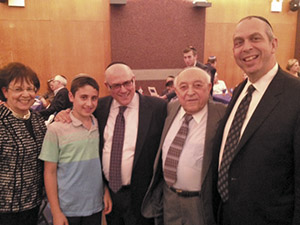
New York—When Rabbi Jacob J. Schacter was growing up, the Holocaust was a constant presence in his home. His father, Rabbi Herschel Schacter, zt”l, had been a U.S. Army chaplain and one of the liberators of the Buchenwald concentration camp with Patton’s army. The elder Rabbi Schacter told his family it was important to get the message out about what had happened in the streets and death camps of Europe. Rabbi JJ Schacter has been getting the message out ever since—this time to students at MTA who interviewed him for the oral history project, Names, Not Numbers.
Founded 11 years ago by Tova Rosenberg, Director of Hebrew language at the Yeshiva University High Schools, Names, Not Numbers teaches students about the Holocaust by training them to interview and film survivors. A senior elective at MTA, this year’s class was the largest yet, with 35 boys interviewing nine survivors, including Dr. Moshe Avital, who was liberated by Rabbi Herschel Schacter. Rabbi JJ Schacter brought the perspective of a second generation survivor and reminisced about his father. The final product, Names, Not Numbers: A Movie in the Making, was shown at a reception for the students, survivors, families and guests Thursday, May 28, in YU’s Weissberg Commons.
Rabbi Michael Taubes, Rosh Yeshiva, called the program “an invaluable life experience” for the students. “It’s very important to have a strong connection to the past,” he told JLNJ. “This is the last generation to hear about the Holocaust first hand.”
Several students interviewed grandparents or great grandparents and Rabbi Taubes said hearing their stories made the students much more appreciative of what they went through. “You can get desensitized. This gives the students an important personal perspective.”
Rabbi Shalom Richter, MTA Coordinator, said hearing survivors’ stories gives the boys some perspective for the struggles they go through. “It’s a welcome opportunity for students to reach back in history and really feel a context of Jewish identity that books can’t do. This brings it out and makes it different. It’s not only an intellectual pursuit. It touches the students deeply. And that’s what makes it so special.”
For the survivors, there was palpable relief in finally talking about their memories. “The survivors were unbelievably moved and grateful,” Rabbi Richter said. “Some hadn’t spoken about their experiences before. They really felt that they contributed to something. One of the survivors was so moved, he came over and gave me a brachah.”
Because the students were high school seniors, much of the work was done independently and through group communication. Rabbi Richter taught academic sessions on the Holocaust, journalist Jacqueline Rivkin worked with the students on interview techniques and filmmakers Mauricio Arenas and Michael Puro taught them documentary filming and editing. After the interviews, Rabbi Richter had a session with the boys to discuss their questions and religious, philosophical issues.
The students were also addressed by Dr. Michael Berenbaum, co-producer of the Academy Award and Emmy Award winning documentary One Survivor Remembers: The Gerda Weissman Klein Story, and former Director of the United States Holocaust Memorial Museum. In an interview for Yeshiva University, he said, “Names, Not Numbers is a unique, imaginative and creative project. The best learning is active learning and it’s a fabulous educational opportunity for students to have this intergenerational dialog with survivors. The project really works and what they produce is terrific.”
The Names, Not Numbers films are archived in the National Library of Israel, Yad Vashem and the Gottesman Library.
By Bracha Schwartz










